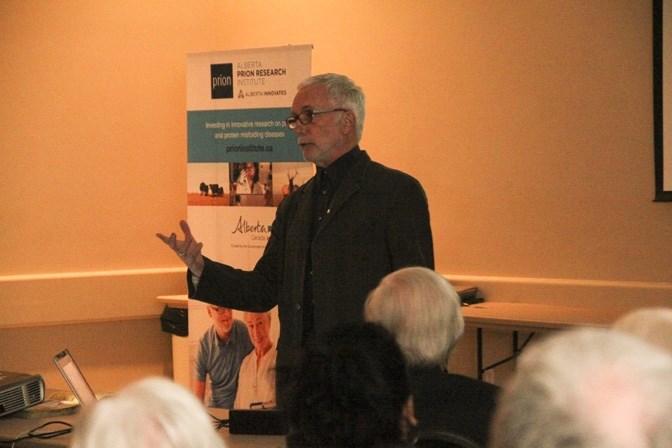Okotokians had the opportunity to hear about Alzheimer’s disease from scientist and television host Jay Ingram last week.
More than 80 people filled the room at the Foothills Centennial Centre as the former Discovery Channel and CBC host talked about Alzheimer’s disease – what causes it, how it effects people, and whether it’s avoidable.
It’s a topic near and dear to Ingram’s heart, though not for the reason most think.
“My mother had it, and most people assume that’s why I’m interested,” said Ingram. “But that isn’t why I wrote the book. I was interested because it’s a fascinating scientific challenge. It might be the most important one in health, given the numbers.
“It’s mysterious still. The best part of science is that you’re trying to solve mysteries. I like that part, and this seems to me to be one of the most important mysteries we have.”
Ingram’s interest in Alzheimer’s research piqued more than a decade ago. Since then he published a book entitled The End of Memory: The Natural History of Alzheimer’s and Aging, which prompted him to conduct extensive research, absorbing the contents of 15 books and 500 scientific papers.
“I don’t claim to remember all of them, but at the time I wrote the book I knew a lot,” said Ingram.
Alzheimer’s research is ever-evolving – there’s a lot people don’t know and a lot they’re still learning, he said. Some ideas have been proven wrong and still more will be in years to come, he said.
Many allegedly promising drugs have surfaced, but none have stuck as of yet, he said. Most recently, news broke that a standard drug for bipolar manic depression looked like it had some effect in mice on removing plaque from their brains. As an existing, licenced drug, it could have easily been approved for additional treatment and be used for Alzheimer’s patients. Some drugs have been approved for testing on humans, with no results at all or harmful effects, he said.
“But that’s sort of what happens at the beginning of a research push,” said Ingram. “You get things that work in animals and look like they’re really good, and some of them actually did reduce plaque but people still got demented.
“So okay, the drug works,” said Ingram. “Unfortunately, the drug doesn’t do anybody any good. So that’s pretty pointless.”
Ingram is taking the message out to communities to provide information to the public. Since most people either know someone with Alzheimer’s or someone dealing with it in a loved one, it’s an important topic and one people need to know more about, he said.
At the end of the talk, a number of hands went up during the question-and-answer period. For Ingram, it was very telling.
Information sessions can help people anticipate or understand what could happen for their loved ones or inspire people to read more, he said. It can also dissuade people from believing everything they hear, he said.
“We don’t want people to get swayed by claims that are bogus,” said Ingram. “‘This food, that food, they will cure your Alzheimer’s.’ You can eat a good diet and that ‘might lower your risk, but here’s no definitive way to say that’s going to cure you.”
For Josef Schweighofer, who farms just outside of Okotoks, the presentation was enlightening. Having heard Ingram on the radio for years, he was interested to hear him talk about Alzheimer’s - especially since he has a friend who is affected.
He found Ingram’s discussion about risk factors like genes, diet, education and mental activity, hearing loss and physical activity particularly interesting.
His friend was a high-functioning corporate lawyer until his late 70s, when he was diagnosed.
“Within a year he was in the home, he couldn’t function at all,” said Schweighofer. “Do I see some factors that contributed to it? For sure. Lack of exercise, diet, clearly.”
It made him think about the affects of his own activities on his health. As a farmer who’s worked with pesticides for years, he said he’s always worried about the possibility of Parkinson’s disease.
As for Alzheimer’s, he said there isn’t history of the disease in his family, so knowing the other risk factors could help reduce the odds of being affected by the disease.
“Nobody in my family has had dementia at this point that I’m aware of,” said Schweighofer. “But who knows, I might be the first one. So yes, there’s definitely a worry.”
Leo Cripps and his wife Cindy attended the presentation because his mother was diagnosed with Alzheimer’s disease in July 2017. They had her checked when her behaviour seemed to change and she was beginning to forget things.
“Until July I was totally dumb to all this. It’s been quite a ride since then,” said Cripps. “I’ve listened to Jay on Quirks and Quarks for years, so it was great to hear his take on this.
“Some of it was old news but a lot of it is something that refreshes you mind and brings back things I’ve read or seen already.”
It’s been a steep learning curve for the family. His mother’s house was sold and she moved to a condo, but Cripps and his wife are on-call all the time, he said.
“It’s like being a hovering parent, because I want to check in on her all the time,” he said. “It’s all the little things, the forgetfulness. You’re hovering, you’re panicking, you’re wondering what’s going on, can she handle this or that.”




